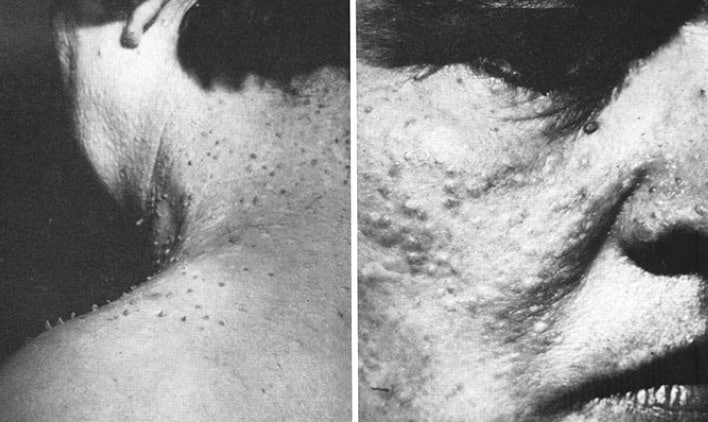Monika Knickenberg
Monika Knickenberg is a German dermatopathologist.
Knickenberg worked with Prof. Dr. med. Otto P. Hornstein University Hospital of Erlangen, Germany. In 1975 they reviewed a 47-year-old referred for evaluation of numerous benign-looking skin tumours following the surgical removal of multiple polyps of the colon, including one colon carcinoma.
Over three publications in 1975 and 1976 they described a new autosomal dominant trait genodermatosis characterized by ‘perifollicular fibromatosis cutis’, heralding extracutaneous cancer proneness – Hornstein-Knickenberg syndrome (HKS)
Biography
- Universität Marburg
- Universität Ulm
- Dermatologische Universitätsklinik, Erlangen, BRD
- Abteilung für Dermatologie der Universität Ulm
Medical Eponyms
Hornstein-Knickenberg syndrome (HKS)(1975)
In 1975, Otto Hornstein (1926–2018) and Knickenberg described the syndrome of multiple perifollicular fibromas heralding extracutaneous cancer proneness and being inherited as an autosomal dominant trait.

Hornstein published an article in 1976 highlighting this ‘rare, generalized genodermatosis’ and a further paper in 1976, with Knickenberg and Mörl highlighting that multiple perifollicular fibromas may herald the presence of colonic polyposis.
We are prone to assume that the (irregular ?) association of multiple perifollicular fibromas and colon polyps represents a distinct nosological entity neither identical with Gardner’s syndrome nor with any other known dermo-intestinal syndrome. Thus, perifollicular fibromatosis should alert the dermatologist to consider periodic thorough examination for intestinal polyps the more as they may change into malignant growth.
Hornstein, Knickenberg 1975: 161
Major Publications
- Knickenberg M. Über den Einfluß von Blutserum des Empfängertieres auf Homoiohauttransplantate bei Meerschweinchen. Thesis. Marburg, 1967
- Hornstein OP, Knickenberg M. Zur kenntnis des schimmelpenning-feuerstein-mims-syndroms. Archiv für dermatologische Forschung. 1974; 250: 33–50
- Hornstein OP, Knickenberg M. Perifollicular fibromatosis cutis with polyps of the colon—a cutaneo-intestinal syndrome sui generis. Archives of Dermatological Research. 1975; 253: 161–175
- Hornstein OP, Knickenberg M, Mörl M. Multiple dermal perifollicular fibromas with polyps of the colon – report of a peculiar clinical syndrome. Acta Hepatogastroenterol (Stuttg). 1976;23(1):53-58.
- Scherwitz C, Knickenberg M, Meigel WN, Rassner G. Zum Krankheitsbild der Tinea nigra. Mycoses. 1976; 19(12): 429-437
- Rassner G, Knickenberg M. Atlas der Dermatologie und Venerologie mit differentialdiagnostischen Hinweisen. 1978
- Rassner G, Knickenberg M, Kahn G. Atlas of dermatology. 1978
- Rassner G, Knickenberg M. Atlas de dermatologie avec diagnostics différentiels. 1985
Controversies
The autosomal dominant inherited syndromes of Hornstein-Knickenberg (HKS) and Birt-Hogg-Dubé (BHDS) are both characterized clinically by the presence of multiple flesh coloured papules of the skin. Hornstein and Knickenberg termed the peripheral lesions of HKS ‘perifollicular fibromas’ whilst Birt, Hogg and Dubé proposed the name ‘fibrofolliculoma’.
The nosological dilemma is twofold:
- Many authors believe that perifollicular fibromas and fibrofolliculomas are one and the same, and not a reason to suppose that the condition described by Birt, Hogg and Dubé (1977) was a new disorder from that originally described by Hornstein and Knickenberg (1975)
- The importance of ‘extracutaneous cancer proneness’, was postulated in all three papers by Hornstein, but not in the 1977 of Birt, Hogg and Dubé. Numerous authors have corroborated the association between multiple perifollicular fibromas and colonic polyps/cancer as Hornstein and Knickenberg suggested.
Prof Dr Rudolf Happle of the Department of Dermatology, at the University of Freiburg staunchly moved for a name change in 2012, and again in 2020
Birt et al. did neither discover nor describe any new cutaneous disorder heralding proclivity to extracutaneous cancer. Hence, the term ‘Birt-Hogg-Dubé syndrome’ represents a bold distortion of history and should no longer be used to describe the disorder specified by Hornstein and Knickenberg…it is not justified to combine the names of the discoverers of a new genodermatosis heralding extracutaneous cancer proneness with those claiming that they had detected a quite different hereditary skin disorder characterized by ‘fibrofolliculomas’, without any proclivity to extracutaneous cancer…Today, time has come to put this right. The syndrome should be named after the original authors, Hornstein and Knickenberg
Happle 2020
- Schulz T, Hartschuh W. Birt-Hogg-Dubé syndrome and Hornstein-Knickenberg syndrome are the same. Different sectioning technique as the cause of different histology. J Cutan Pathol. 1999; 26(1): 55-61.
- Happle R. Hornstein-Birt-Hogg-Dubé syndrome: a renaming and reconsideration. Am J Med Genet A. 2012;158A(6):1247-1251.
- Happle R. Hornstein–Knickenberg syndrome vs. Birt–Hogg–Dubé syndrome: a critical review of an unjustified designation. Journal of the European Academy of Dermatology and Venereology 2020; 34(4): 885-887
References
- Bibliography. Knickenberg, Monika. WorldCat Identities
- Knickenberg, Monika. Virtual International Authority File

